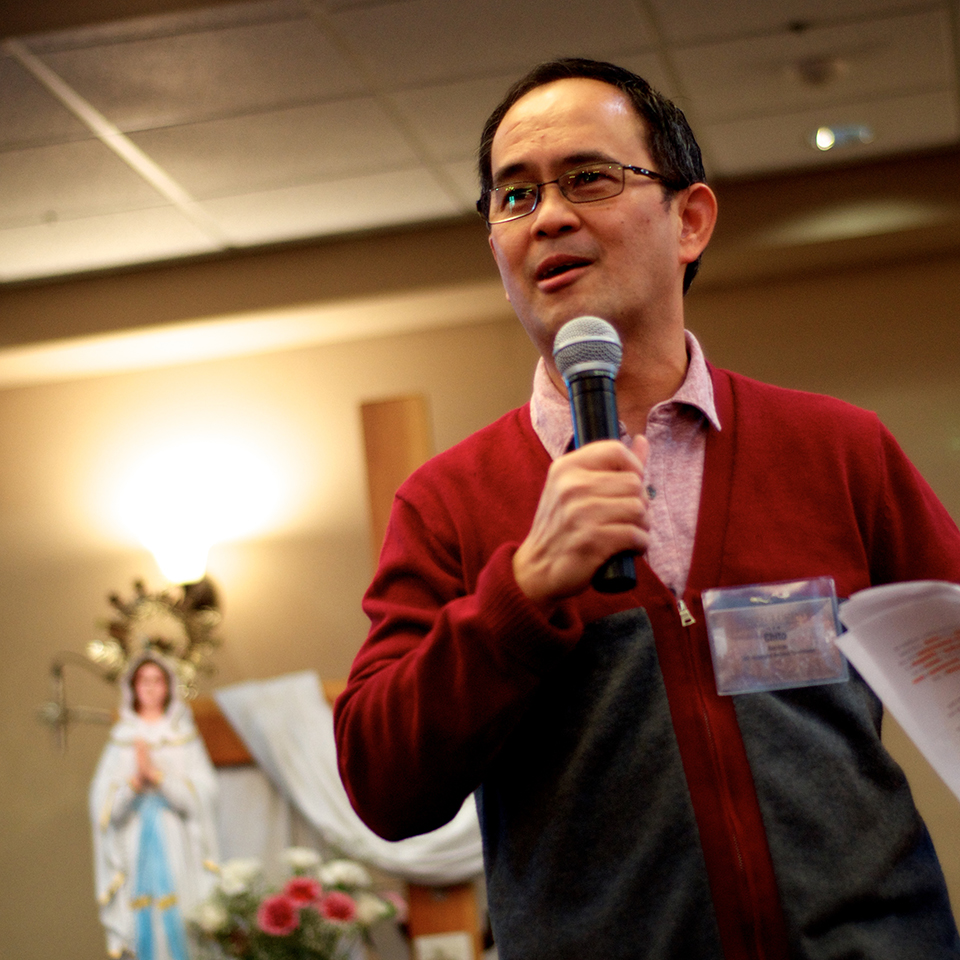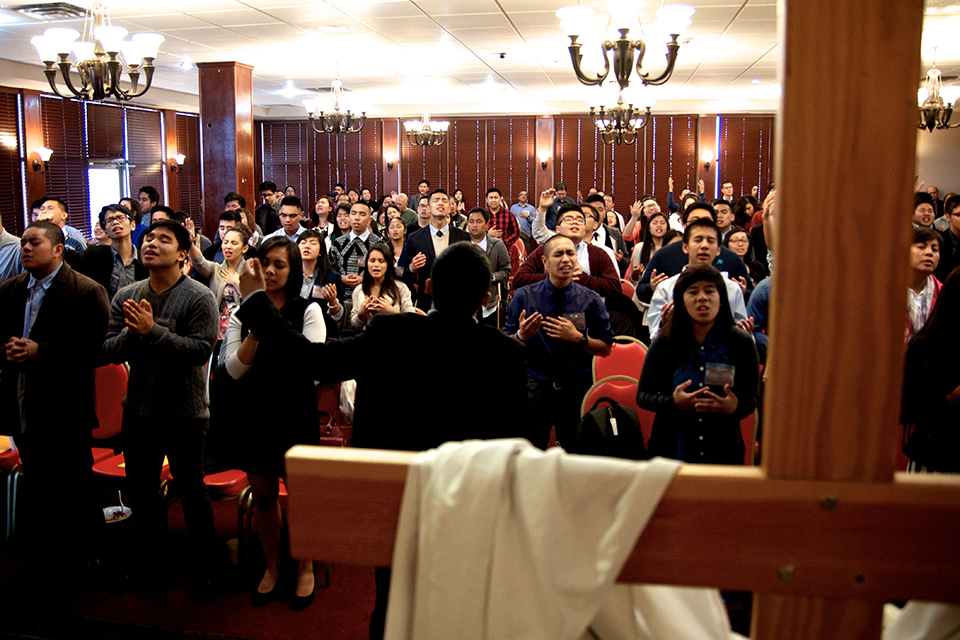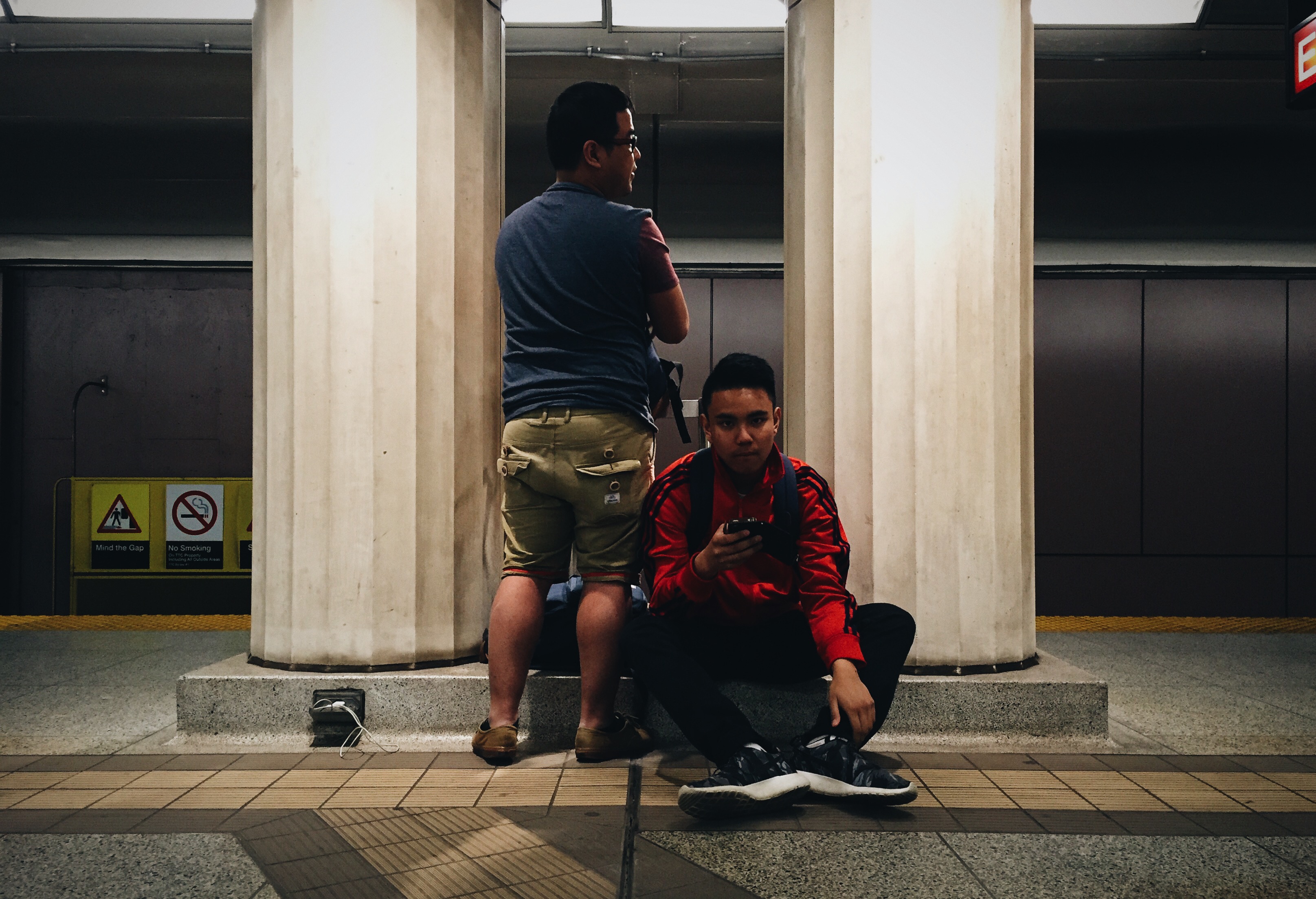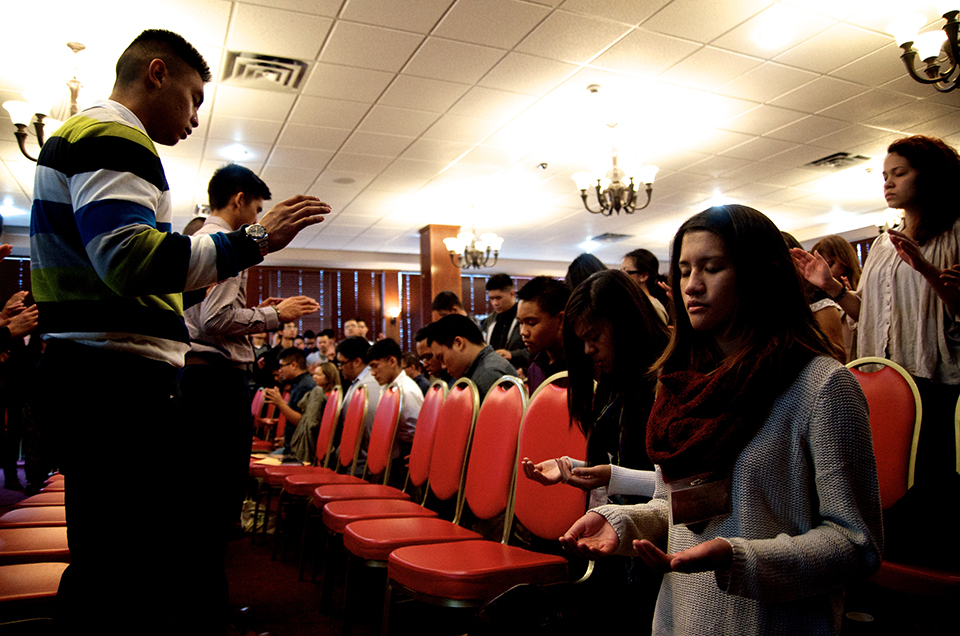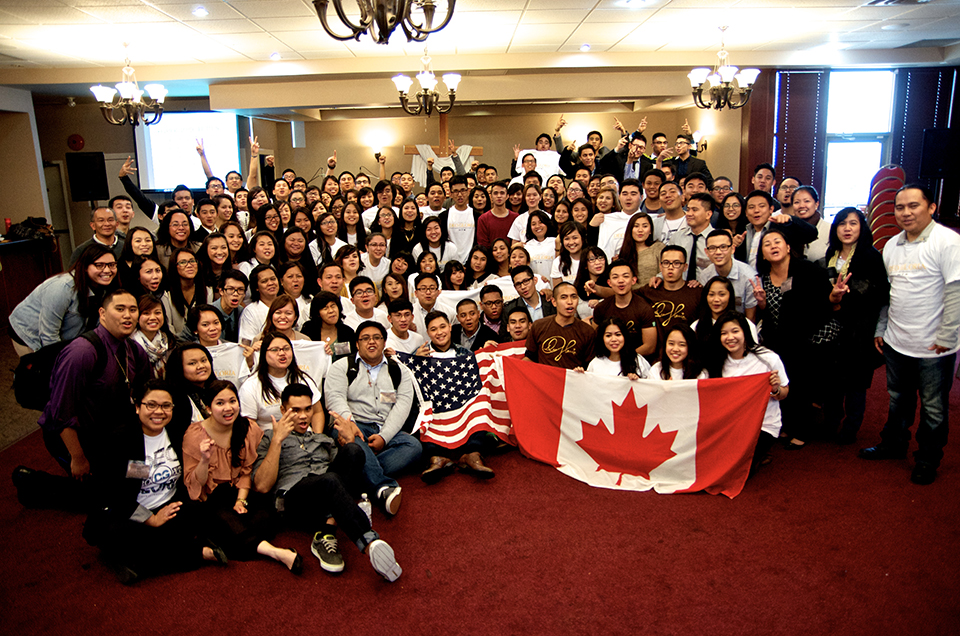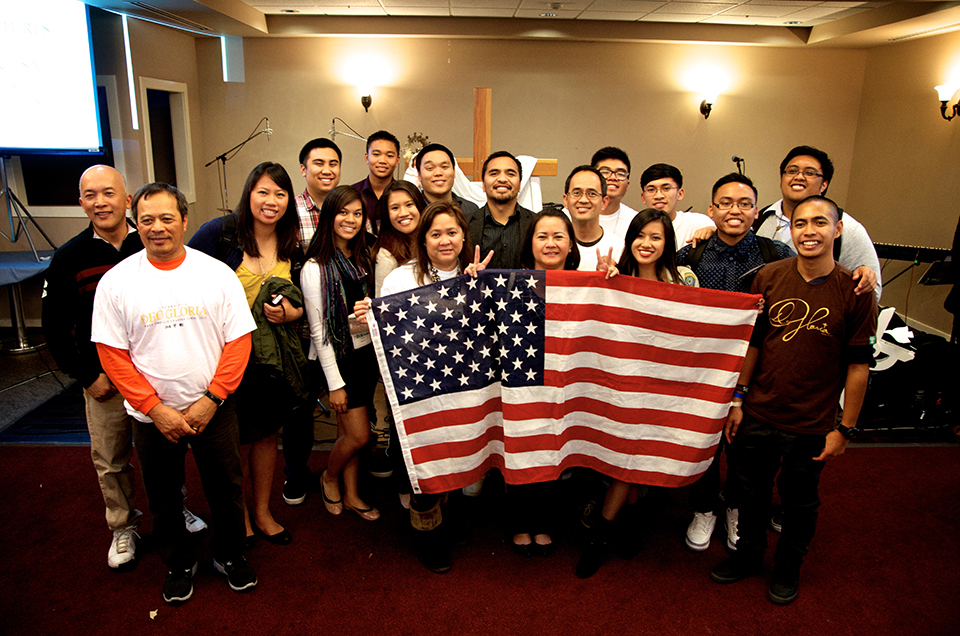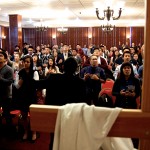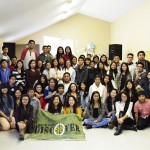Tito Chito Barrios, CFC-Youth National Coordinator in the United States, speaks to the attendees at the North American Leaders Summit on Saturday, October 19, 2013. (Photo: Jesse Roca)
Beginning today, we will be posting interviews with three CFC Coordinators which conducted following the end of the North American Leaders Summit. Today, we end our coverage from the American side of things with an interview with Tito Chito Barrios, conducted by National YCOM Press Head John Ray Catingub. Join us on Monday and Tuesday for interviews with Tito George Fournier, National CFC-Youth Canada Coordinator, and Kuya Lawrence Quintero, International CFC-Youth Coordinator for North America!
[divider]John Ray Catingub (YCOM): And you are?
Tito Chito Barrios: I am Tito Chito. I’m from Valencia, California. I’ve been in the (Couples for Christ) community for 9 years and a coordinator for 8 years. (I’m) presently serving as National Youth Coordinator for the United States for two years and (with) another term coming up! I got reappointed for another two years starting in January.
YCOM: Okay, praise God!
Tito Chito: I’m blessed with two girls, two daughters. They’re 19 and 20. My eldest is in San Francisco taking biochem as a preparatory for pharmacy and my youngest is with me here. She’s a sophomore college student at Cal State North Ridge taking up psychology.
YCOM: Okay, okay, awesome. So I’m just going to jump right into the questions because I don’t want to keep you too long. So, the first one: as a delegation from the States, I know it’s close, but obviously you faced a lot of challenges just getting here. One: it’s short notice a little bit, two: you’ve got to fly in from the east coast and even from the west coast it takes some time. So, my question is: What kind of challenges did this pose for, not only you, but the community in the States and how did you overcome those challenges?
Tito Chito: Okay, the very foremost, of course, is finances. Since, of course, everybody here is a volunteer, everybody has to pocket their expenses. And during these hard times parents can have a hard time financing fares and just plain expenses for our youth leaders to come. Even the CFCs of USA were having a hard time financing. So even if you ask for subsidy, some regions in the United States just can’t provide for expenses. That’s just one thing.
And another challenge that we saw is the need for Full-Time (Pastoral) Workers. It would have been a big help if we had some push, if we would have been helped, not just for the Coordinators. Of course, if there (was) a little push for a Full-Time Worker or even a Mission Volunteer, at least convincing some of our youth leaders to come. Even themselves, Full-Time Workers, it would have been great if they were here, considering what happened (and what) transpired over the weekend. We still have a lot and we’ve learned a lot from Canada and it even answers some of the questions we have through this Summit.
YCOM: Okay. So, how many people did you bring all-in-all?
Tito Chito: As far as the United States is concerned, we had 36 delegates. That includes 3 of the National Core members. So if you’re going to count the coordinators and the youth leaders, there are 33. As far as the coordinators are concerned, there might be around… Eight of them are coordinators from all over the United States. And then one Mission Volunteer and one Full-Time Worker.
YCOM: Okay, okay cool. Alright, so really what makes CFC-Youth in the United States unique? This can be answered in any way: parish involvement or even just what you’ve seen from Canada; how are you guys unique?
Tito Chito: I’ve discussed this with the Core last night and this morning. We’re all doing this for God, you know? What we do, if that’s the best that we can do, God is honoured with that. But there are a lot of things that we need to do. Yesterday in that exercise on listening with that reflection question on how you could address the present problems in your respective areas, being part of the National Core, it’s really hard to answer. I even had to step out of the hall to get some answers because, though we’re doing our best, it seems like we have more and a lot to learn. We still have a lot to learn.
I might be in the USA National Core but I still have a lot of room to improve. I still have a lot to learn. Being here in this Summit really helped me a lot. I helped out setting this up with Brother George (Fournier), my Canadian counterpart, and I never expected–I knew it was gonna be big–but I never expected it to be this huge! I never expected that I, myself, would learn a lot from Canada.
What makes us unique? We do the same thing, Canada and the United States. We worship the same God. we do Liveloud and everything, we do worship the same thing (as Canada) but here in Canada you do a lot more than what we do in the United States. I could attest to that; even our youth leaders who are here could attest to that. Canada is more–you would say–aligned with what CFC-Youth in the Philippines does. That’s why I said we have a lot to learn from Canada.
I would try my very best with the National Core, especially the National Core who will be taking over come this year, to do our best. Maybe try and see what Canada does. Anyway, whatever applies to Canada, of course, applies to the United States. So we will try and see what uniqueness Canada has that probably the Americans, the United States, can emulate. As far as going above (and beyond) with what the ministry is concerned (with).
YCOM: Okay, I do want to honour you guys for even bringing so many CFC-Youth here on such short notice and even seeing the way that they worship and how unique they are, like when they’re (cheering) during the fast songs. That was really nice to see.
Tito Chito: You know what? It’s funny. I (worship) in my own (way). I don’t know what (other) coordinators do, what youth leaders do. But personally, what I do is, when they start–not just CFC-Youth (but) in general–what I do for myself is, even in the fast songs, I stay still, raise my hands, and just listen. I won’t even sing.
That would bring me tears. I just talk to God and say, “God, is this how it sounds like up there?” It’s funny; there are times it just makes me sob–on a fast song! Normally you sob or you cry when it’s the slow song because it affects you more but to me, to me personally, it’s everything. I just stand still and listen to the voices of these youths, to your own voices. It feels like angels singing and then, all of a sudden, everybody praises (in) tongues. I go, “Lord, is this Heaven? There’s no place I’d rather be right about now.”
We have this song in the States. I don’t know if you sing it here in Canada. But there’s a song in the United States where we sing, “There’s no place I’d rather be, no place I’d rather be, than here in Your love, here in Your love.” You sing that over and over and over and I just stand and sing it in my mind. I just sing it in my mind because, if I sing it vocally, if I would hear my voice, I don’t want to hear that. (Laughs) That would just break my–you call it meditation–I don’t know what you call it! But that’s how I enjoy. Probably that’s the answer.
I did a talk and my guide question was, “How do you commit? What makes you commit? What makes you come back?” I guess that feeling is what makes me come back. It’s like, I’ll be a fool not to come back. I’ll be a fool not to serve. I’ll be a fool not to be a leader of this group. It’s just a blessing.
YCOM: And, I guess, a couple more questions. I don’t want to keep you too long.
Tito Chito: No, that’s fine.
YCOM: So, with our five-year goals and, especially to integrate with the Church and, most prevalently to reach out to Mexico, definitely geographically, the States is in a position to do that. In what ways are you guys inspired to move in (the direction of Mexico)?
Tito Chito: As far as moving to Mexico is concerned, it really falls on me personally. Why? I’m two hours away from the border. Actually, this morning I already had–while we were having that workshop on our missions, you know, “conquer Mexico”–I already spoke to my coordinator who is a step (away) and you’re in Mexico! And I said, “You know what, this falls on us. Not just you but it falls on me because we’re right there. All we’re gonna do is hop over and we’re in Mexico.” So we’re going to have to find resources. We’re going to have to find contacts.
I work with a lot of Mexicans, Catholics. I said, “You know what, we’re gonna have to reach out to these people.” We have a lot of Youth in San Diego whose friends or classmates just cross over the border. We’re gonna have to reach out to them. We’re gonna have to take this initiative, we have to take this responsibility of “conquer Mexico” because we’re right there. We’re going to have to own this conquering. We cannot just leave this to anybody else but southern California! We cannot give this to northern California; we can’t even give this to Vancouver! We’re right there. So we’ll call on them if we need help but we’re going to have to reach out and find our ways to cross over.
It’s a challenge, yeah. It’s hard. Of course it’s hard! But who says it’s going to be easy? Look at me. Serving God is not easy. We’re going to have to take the initiative. I’ve already planned out–not necessarily an echo of this Summit–it’s going to be my plan for January to begin the year by giving a leaders training and this will be a part of the leaders training, nationally of course. (In) January, it’s the first activity that the youths are gonna have: a leaders summit. But this time we don’t need to give them the questions. The answers are already here. What we’re going to have to do is pick. And then right there, let’s talk. Let’s talk (about) conquering Mexico, right there in the beginning of the year. With God’s graces and God’s help, and guidance of course, hopefully we can do it.
YCOM: I guess, to close off… but do you have anything else to say? Just to close off, anything that you want to say, really.
Tito Chito: I’m just so grateful that Canada hosted this. Actually, when Tito George just–when we were trying to plan this out right around, I think it was, around July or August when we were planning to do this. And Tito George just said, “You know what, we’re willing to host it.” I’m glad that he did it, not because of the hard work but it’s because I’ve learned a lot from him. I’ve learned a lot from Brother George. I thought being a National (Coordinator) is already know(ing) more, I mean, much of the ministry but no, it’s not.
It’s really an honour being here and, like I said earlier, being a coordinator–a National Coordinator–doesn’t mean you’re blessed with already know(ing) everything. It’s just amazing that I learned a lot, I mean, a lot more. I really have a lot of room for improvement. I’m just grateful that this weekend happened.
YCOM: Okay, praise God, Tito!

